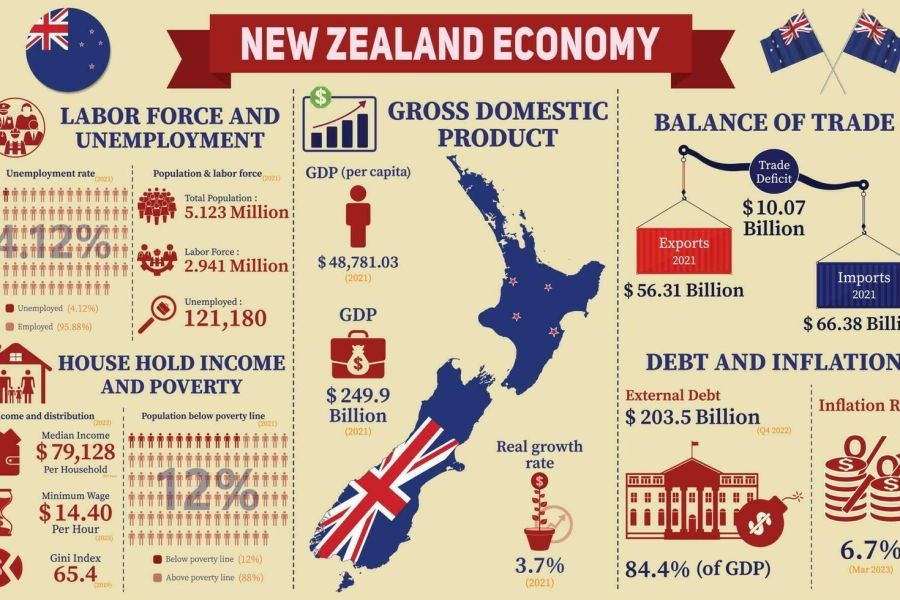New Zealand's unique position in the Asia-Pacific region offers both opportunities and challenges that significantly impact its economy. As an integral player in this vast landscape, New Zealand is navigating a complex web of economic interactions, technological advancements, and evolving policy frameworks. Understanding these dynamics is crucial for healthcare consultants and industry stakeholders aiming to leverage these developments for strategic advantage.
New Zealand's Economic Influence in the Asia-Pacific
New Zealand's economy, while relatively small, plays a significant role in the Asia-Pacific region. With its robust agricultural exports, innovative technology sector, and strategic trade partnerships, New Zealand has positioned itself as a key player. According to Stats NZ, the country's GDP grew by 5.1% in 2022, reflecting its economic resilience and adaptability.
Case Study: Fonterra's Influence in the Dairy Industry
Fonterra, New Zealand's largest company, is a prime example of the country's economic impact on the Asia-Pacific region. As a global dairy giant, Fonterra's operations significantly influence regional dairy markets, affecting pricing, trade policies, and agricultural practices.
Problem:
Fonterra faced challenges with fluctuating global milk prices and regulatory barriers in key markets like China.
Action:
To address these issues, Fonterra diversified its product offerings and invested in sustainable farming practices. The company also strengthened its supply chain resilience by forming strategic partnerships across Asia.
Result:
Fonterra reported a 7% increase in revenue in 2023, with exports to Asia accounting for over 45% of its total sales. This success underscores the importance of strategic adaptation in a volatile market.
Takeaway:
This case study illustrates the potential of leveraging local strengths to influence broader regional markets. New Zealand businesses can emulate Fonterra's adaptive strategies to enhance their competitive edge in the Asia-Pacific.
Data-Driven Insights: The Role of Technology
Technology is a driving force in New Zealand's economic landscape. According to NZTech, the country's tech sector contributes over NZD 16 billion to the GDP, with exports growing at a rate of 14% annually. This growth is fueled by innovations in AI, biotechnology, and digital services, positioning New Zealand as a tech hub in the region.
Case Study: Xero's Impact on Accounting Software
Xero, a New Zealand-based company, has transformed the accounting software industry with its cloud-based solutions. Its influence extends across the Asia-Pacific, where small and medium enterprises (SMEs) benefit from streamlined financial management.
Problem:
Traditional accounting systems were cumbersome and inefficient for SMEs, limiting their scalability and growth potential.
Action:
Xero introduced user-friendly, cloud-based accounting software that integrated seamlessly with existing business processes. The company focused on enhancing user experience and offering competitive pricing.
Result:
By 2023, Xero had acquired over 2.7 million subscribers globally, with a significant user base in Australia and Asia. This success highlights the demand for innovative tech solutions in the region.
Takeaway:
Xero's growth demonstrates the value of leveraging technology to address market needs. New Zealand businesses can harness similar innovations to expand their reach and improve operational efficiency.
Contrasting Perspectives: Free Trade Agreements and Economic Growth
New Zealand's participation in free trade agreements (FTAs) has been a topic of debate. While FTAs offer access to larger markets and reduced tariffs, they also pose challenges such as increased competition and regulatory complexities.
Advocate Perspective
Proponents argue that FTAs are essential for New Zealand's economic growth. They cite the Comprehensive and Progressive Agreement for Trans-Pacific Partnership (CPTPP), which has boosted exports by 6% since its inception, according to the Ministry of Business, Innovation and Employment (MBIE).
Critic Perspective
Critics, however, caution against over-reliance on FTAs, highlighting the potential for trade imbalances and loss of domestic industry control. They emphasize the need for robust protection measures to safeguard local businesses.
Middle Ground
The consensus is that while FTAs are beneficial, New Zealand must adopt a balanced approach, ensuring that domestic industries are supported and that trade policies promote sustainable development.
Common Myths and Misconceptions
In understanding New Zealand's economic impact on the Asia-Pacific, it's important to debunk common myths that can mislead stakeholders.
- Myth: "New Zealand's economy is too small to make a global impact." Reality: Despite its size, New Zealand's strategic industries, such as dairy and technology, have a significant influence on regional markets.
- Myth: "FTAs only benefit large corporations." Reality: FTAs facilitate market access for SMEs, enabling them to compete internationally and expand their customer base.
- Myth: "Technology adoption is slow in New Zealand." Reality: The tech sector is one of the fastest-growing industries in New Zealand, with rapid adoption of AI and digital solutions.
Future Trends and Predictions
The future of New Zealand's economic landscape in the Asia-Pacific is shaped by emerging trends in technology, trade, and sustainability.
According to a Deloitte report, by 2028, 50% of New Zealand's exports are expected to be tech-based, driven by advancements in AI and digital transformation. Additionally, environmental sustainability will become a core focus, with businesses adopting greener practices to meet global standards.
Conclusion: Strategic Opportunities for Healthcare Consultants
For healthcare consultants, understanding New Zealand's economic dynamics in the Asia-Pacific is essential for advising clients on strategic investments and growth opportunities. By leveraging data-driven insights, consultants can guide businesses in navigating the complexities of regional markets, ensuring sustained success and innovation.
What's your perspective? Share your insights and let's discuss how New Zealand's economic strategies can shape the future of the Asia-Pacific region.
People Also Ask (FAQ)
- How does New Zealand's economy impact the Asia-Pacific region? New Zealand's strategic industries like dairy and technology significantly influence regional markets, enhancing trade and economic collaboration.
- What are the biggest misconceptions about New Zealand's economic role? A common myth is that New Zealand's economy is too small to matter globally. However, its impactful industries play crucial roles in regional dynamics.
- What are the best strategies for New Zealand businesses to expand in the Asia-Pacific? Experts recommend embracing technology, forming strategic partnerships, and leveraging FTAs to enhance market access and competitiveness.
Related Search Queries
- New Zealand economic growth 2025
- Impact of free trade agreements in New Zealand
- New Zealand technology sector trends
- Fonterra Asia-Pacific market influence
- Xero accounting software expansion
- New Zealand and CPTPP
- Sustainability practices in New Zealand
- Asia-Pacific trade dynamics
- New Zealand export statistics
- Future of New Zealand's economy































